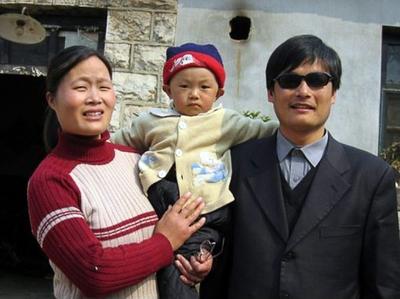Chen is not only daring but clever, because his escape publicises China’s human-rights abuses in a way that makes it impossible for either side to ignore.
Chen’s escape was surely timed to coincide with the annual US–China talks in Beijing, attended by secretary of state Hillary Clinton and secretary of treasury Timothy Geithner. Clinton has mentioned Chen in pleading for greater attention to human rights in the past and is therefore unlikely to overlook the issue, let alone back-track on her position.
But if the issue of Chen’s escape flares up in the domestic political arena on either side, it could escalate out of control and seriously damage bilateral relations just as the US is starting to get some traction from China on matters such as Iran, North Korea, and currency rates. Meanwhile, Beijing is trying desperately to keep Chen out of the media, especially out of blogs such as weibo.
Chen has leverage on Beijing and Washington. Beijing wants to close ranks over the Bo Xilai scandal, which they depict as purely criminal, when, in fact, it was mostly political. The Standing Committee will let nothing disrupt the orderly transfer of power to Xi Jinping at the party congress to be held in October 2012. Washington too wants a smooth transition and does not want to be pushed into an uncomfortable corner.
Chen’s gambit could go terribly wrong, given what we know about factional politics within the Chinese Communist Party. Those who still support Bo Xilai could use the Chen incident to claim the current Standing Committee is soft on dissent and soft on the US — an argument that will appeal to hardliners who are ready to see US plots to destabilise and weaken China everywhere.
The question remains: how did Chen gain admission to the US embassy and who made the initial decision? Answering this could reveal whether Washington was complicit in his escape. The embassy is closely guarded, but Chen could have gotten into the visa line before Beijing police were alerted to his escape. The decision to accept him may have been made on the spot without guidance from Washington. Once Chen was in the embassy, even for a few minutes, he could not be easily dismissed.
This is, in no small measure, because of the US election. As usual, the incumbent US president is denounced for being soft on China, but the furore will die down after the election as the realities of governance and economic ties with China are rediscovered. The Obama administration will not give Mitt Romney any ammunition, so Chen is safe in the embassy, at least for a while.
Chen stated that he does not wish to leave China but wants Premier Wen Jiabao to acknowledge forced abortions and sterilisations and his own confinements and beatings. But a regime of frightened control freaks is unlikely do this. Instead, they will likely agree — privately and quietly — to let Chen out of the country after a decent interval and without fanfare. The model for this is the one-year embassy stay of dissident astrophysicist Fang Lizhi, followed by his quietly leaving China on a US Air Force plane in 1990. When they want to, the White House and Zhongnanhai can arrange these things.
If Chen refuses to leave China, it is likely that sometime after the US elections he will be told that he and his family can move to the US, but he cannot stay in the embassy forever. Even if Romney comes into office, his billionaire Republican donors will not let him jeopardise their China business connections.
Chen’s US embassy protection in Beijing dwarfs the problem of police official Wang Lijun, who sought asylum in the US consulate in Chengdu in February 2012. Asylum for Wang was out of the question — there would have been no way to get him out of China — and he evoked no human rights sympathies. So, after debriefing Wang in the consulate for more than 30 hours on the Bo Xilai scandal, he walked out into the arms of Chinese state security, a decision that may have saved his life. Chongqing police have every reason to silence Wang, but Some factions in Beijing surely want him alive to testify against his former boss.
To avoid giving individuals — however praiseworthy their cause — undue leverage in the future, embassies need firmer rules on ‘walk-ins’. Chinese walk-ins should be considered only at US embassies in third countries. Without such a rule, Chinese dissidents may make a habit of seeking asylum in US diplomatic offices, placing excessive strain on US-China relations.
Michael G. Roskin is a retired political scientist. He taught as a Fulbright lecturer at the University of Macau.

